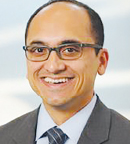
Yousuf Zafar, MD
At the Plenary Session, formal discussant of Dr. Davidoff’s study, Yousuf Zafar, MD, of Duke Cancer Institute, Durham, North Carolina, gave an impassioned talk about the need to address racial disparities in cancer care. “This is a nontraditional study to be selected for the ASCO Plenary Session. I believe it was selected for two reasons: it is a practice-changing study, and it is proof-of-concept that policy can improve access to care can reduce disparities,” he told listeners.
“Cancer injustice is not a scientific problem. It is a policy problem. We need to level the playing field,” Dr. Zafar stated. He alluded to the “elephant in the room”—the racial prejudice deeply ingrained in much of American society. Even though slaves were emancipated in 1863, it took the Civil Rights Act 100 years later to address the “separate but equal” fallacy, according to Dr. Zafar. “Health-care segregation led to poor outcomes for generations of black individuals. The 2010 Affordable Care Act sought to reduce health disparities,” he continued.
In 2012, the Supreme Court left discretion to expand Medicaid to the states; at present, 14 states have not expanded Medicaid. “If they did, further expansion would cover 4.5 million additional patients,” Dr. Zafar said.
“The study presented here today shows that the preexpansion disparity between black and white patients disappeared when access to care was equalized. Some think the answer is universal health care, but even in countries with universal health care, lower socioeconomic status is associated with disparity, so there must be a missing piece,” he continued.
A Leap Forward in Using Real-World Data
According to Dr. Zafar, that missing piece is data, since cancer injustice is also a data problem. “In keeping with this year’s meeting theme, we need to learn from patient interaction. Every encounter should inform the next,” he noted.
He continued: “We need to shift the data paradigm and understand how to safely and appropriately use our patients’ data. This study is a leap forward and provides proof of concept that health-care systems can use their data to improve outcomes and possibly reduce disparities. If we could use real-world data in real time, we could inform real-world interactions, but the first step is to collect data and then clean and analyze it.”
Dr. Zafar said this study suggests that improved access to care is linked to the timeliness of treatment. And he hopes that this study will change cancer care for tomorrow. “We need to institute interventions that help our patients navigate the complicated path of cancer care. We need to engage with our policymakers and advocate for our patients, so they receive the best cancer care possible,” he concluded. ■
DISCLOSURE: Dr. Zafar’s spouse is an employee of Shattuck Labs, he is on the advisory board of AIM Specialty Health, Vivor, LLC (uncompensated), and SamFund (uncompensated); is on the Board of Directors of Family Reach Foundation (uncompensated); has received research funding from the NIH and AstraZeneca;is a board member of Copernicus-WCG IRB; and is a consultant with RTI, McKesson, Discern, LLC, and Quintiles Corporation.


